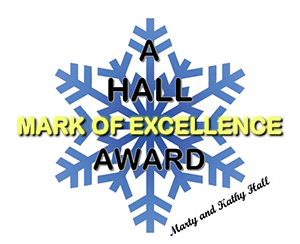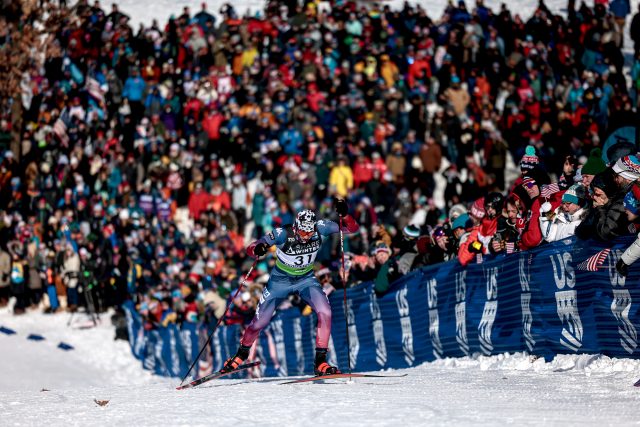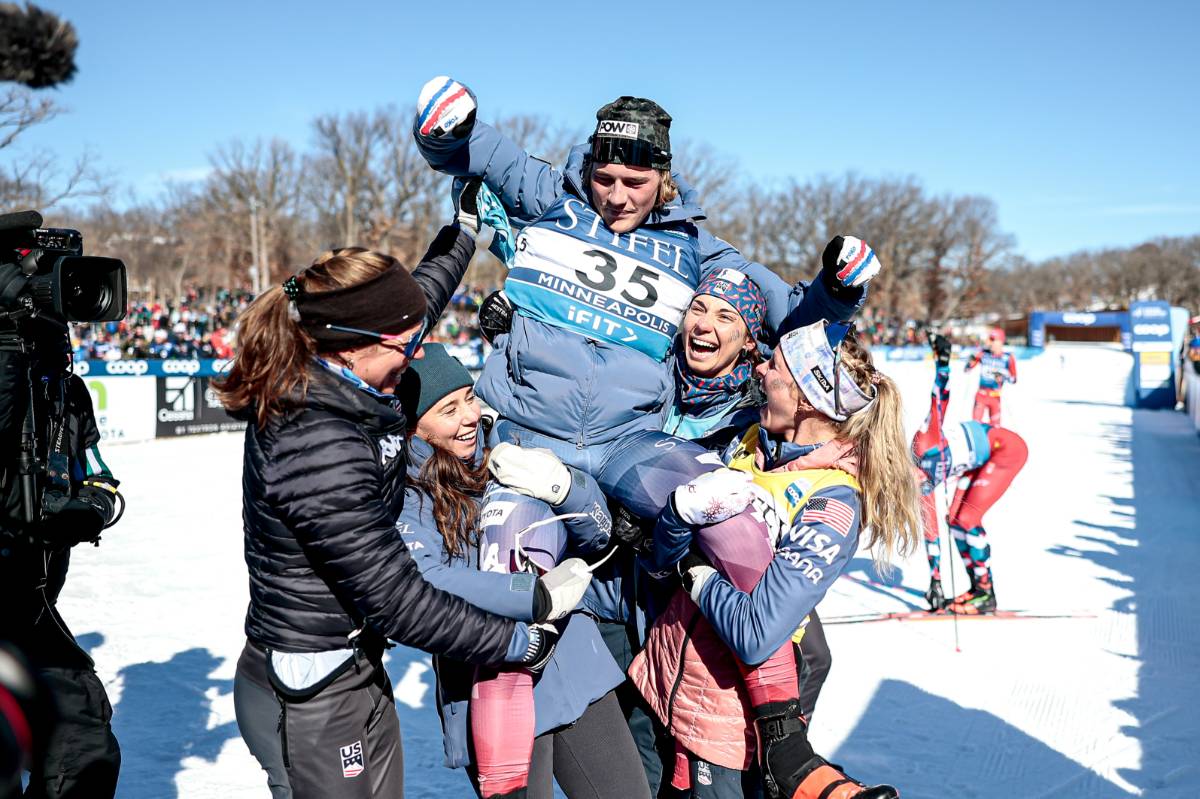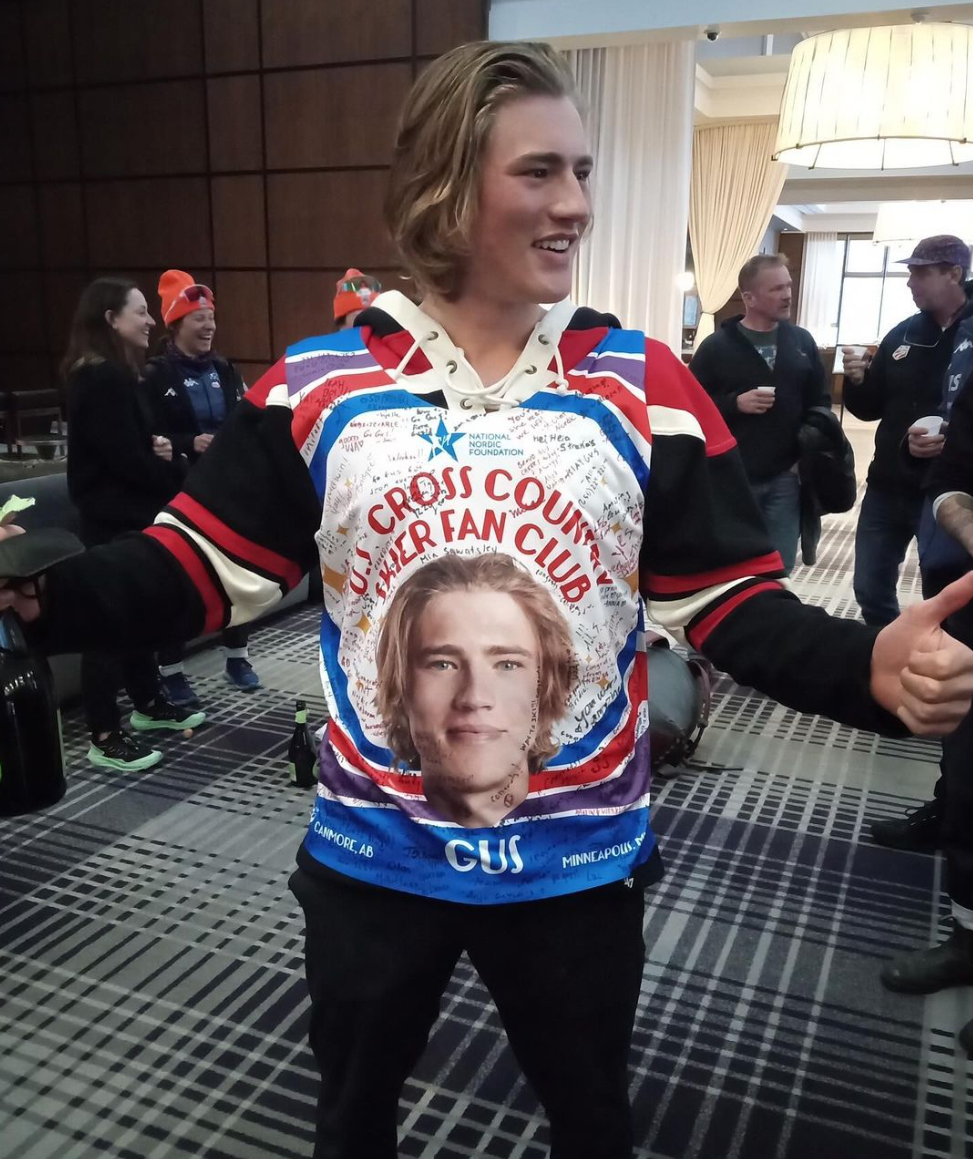 This coverage is made possible through the generous support of Marty and Kathy Hall and A Hall Mark of Excellence Award. To learn more about A Hall Mark of Excellence Award, or to learn how you can support FasterSkier’s coverage, please contact info@fasterskier.com.
This coverage is made possible through the generous support of Marty and Kathy Hall and A Hall Mark of Excellence Award. To learn more about A Hall Mark of Excellence Award, or to learn how you can support FasterSkier’s coverage, please contact info@fasterskier.com.

After the 2018 Olympics, workers at the Minneapolis Parks and Rec Department had to start putting up posters in the old Theodore Wirth Park chalet to “Clean up your glitter.” Thousands of Minnesota high school cross country skiers who raced there were emulating Jessie Diggins’ famous race-day tradition. The glitter was making a mess, but in Minnesota’s ski-crazy Nordic community, that particular problem was a wonderful one to have. Swix pants and stray gloves dusted in pesky golden glitter-flakes only testified to more young skiers wanting to “Ski like Jessie.” After having watched her win Olympic Gold, they all had a shared idea of the world contained in that simple phrase.
Six years later—again in Minneapolis—Jessie Diggins would bring her glitter to the FIS Cross Country World Cup in Theodore Wirth Park, the first World Cup race held in the United States in over twenty years. What followed was a weekend that most witnesses would describe as “something special.” Twenty thousand American spectators attended a cross-country ski race in America, and on the second day an historic and improbable win from a young Alaskan named Gus Schumacher. It was the first World Cup win of Schumacher’s career, and the first for an American male skier in over forty years. In a banner winter for American skiers (Jessie Diggins winning her second World Cup Overall and seven American skiers finishing on World Cup podiums), Gus Schumacher’s win on home soil was a clearly an emotional apex.
Cut to last week, when the International Ski Federation (FIS) put out a fan vote on its Facebook and Instagram pages to award the “Best Distance Performance of the Year” from this year’s World Cup. Nominees included a predictable slate of Scandinavian stars—Johannes Hoesflot Klaebo, Frida Karlsson, Simen Kruger—but there was a distinctly American flavor to the list of nominees. Three different Americans, with three different performances, made the shortlist. Jessie Diggins was nominated for her early-season 10 k win in Gallivare, Sweden, while Sophia Laukli got a nod for her first World Cup win at the Alpe Cermis Hill Climb. The clear winner of the poll, though, was Gus Schumacher’s victory in Minneapolis.
The “Best Distance Performance of the Year” poll may have been little more than FIS plumbing social media engagement during the doldrums of spring. Even so, in this test of public opinion, Schumacher was the clear winner. That consensus may also be suggestive of more good things to come. As the weather warms, so does the prospect that Schumacher will earn more titles from even more lofty sources. He is likely to be on the shortlist for any kind of upcoming “Athlete of the Year,” or “Skier of the Year” award granted by ski governing bodies and media organizations. He certainly is on the shortlist at FasterSkier.
The extent to which those shortlists and awards shake out will be revealed in time. For now, this informal FIS award was a neat checkpoint smack dab in the middle of the offseason. Two months removed from the World Cup events in Minneapolis, the snow is gone from Theodore Wirth Park. The first blades of grass poking through the mud spell out a clear way forward to spring. It’s a nascent time; with it comes some nascent clarity on what exactly the Minneapolis World Cup—and Gus Schumacher’s win—mean to American skiing.

A look at the comments on the FIS Instagram post soliciting votes for “Best Distance Performance” reveals a unified front supporting Schumacher. The question of which individual World Cup performance stood out most to viewers and fans produced an outpouring from American skiers, World Cup champions, and Birkie Birchleggers alike. Some came to the comment section with heartfelt stories on what it was like to process the surprise win as Schumacher, himself, was processing it. How Schumacher started early with Bib 35, crossed the finish line with a 15 second lead, took his turn in the winners’ chair, and watched as every great champion of the sport crossed the finish line splitting seconds behind him until there was no other conclusion to reach: almost impossibly, Schumacher had won. Others came in with more emphatic exclamations: who should win the best performance of the year? “GUS!”
In short, Schumacher’s win in Minneapolis validated itself. If you watched it, you understood why it’s worth striving to do anything well. Why spend years building a ski community in Minneapolis, re-working and expanding a venue at Theodore Wirth Park as the Loppet Foundation did? Why combine the talents of countless individuals across the United States towards developing, of all things, cross country skiers? As Schumacher and his American teammates celebrated at the finish line, the answer became apparent: so that a skier like Schumacher could combine talent, drive, and passion in order to exceed even the expectations he set for himself. The defining characteristic of Schumacher’s win in Minneapolis, though, was Schumacher beaming in an interview immediately after. “I don’t know, this is just the best day ever!” he said.
It took a crowd of 20,000 fans raising their voices along the sides of a Minneapolis ski trail to propel Schumacher toward his unlikely victory. In doing so, the crowd—and Schumacher, himself—revealed the power of what collective energy harnessed in the right individual can do.
Of course, among the FIS “Best Distance Performance” nominees there were two other Americans who delivered the lesson just the same. Jessie Diggins in Sweden was incredible. Sophia Laukli on the Alpe, sublime. Why though, when asked to make the hard choice, did so much of US Skiing latch onto Schumacher? The difference must’ve been found in the venue: Minneapolis, a community versed in sports, versed in the sport of cross-country skiing, and versed in the lessons that sport teaches. For a weekend in February, Minneapolis was a conduit for community spanning an entire continent. Minneapolis ski fans could uniquely recall Jessie Diggins from her time starting out in Afton through to the present day when she epitomizes what skiing can teach you about life: Olympic moments, World Cup triumphs, and all the highs and lows in between.
The testament to Gus Schumacher’s win in Minneapolis, then? This summer, there are sure to be even more young skiers at practices, at camps, pursuing the challenges of cross country skiing. Theodore Wirth Park may still be the place you need to clean up your glitter, but in places throughout our Nordic community young athletes will give voice to a dream to “Ski like Gus.” That day in Minneapolis will flash in their memories, and a smile will cross their faces. “Best Distance Performance of the Year” for certain. And, by all indications, for a whole lot longer too.

Ben Theyerl
Ben Theyerl was born into a family now three-generations into nordic ski racing in the US. He grew up skiing for Chippewa Valley Nordic in his native Eau Claire, Wisconsin, before spending four years racing for Colby College in Maine. He currently mixes writing and skiing while based out of Crested Butte, CO, where he coaches the best group of high schoolers one could hope to find.



